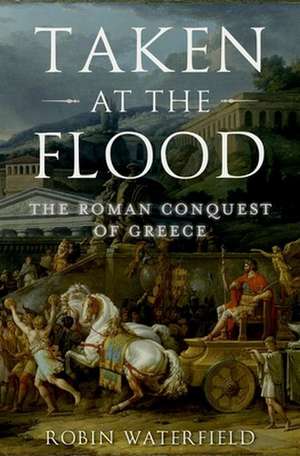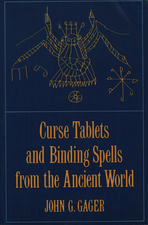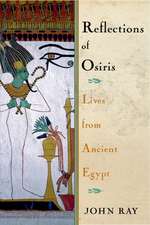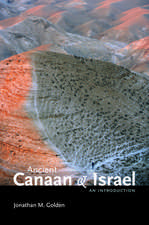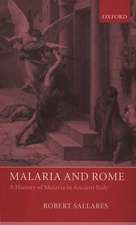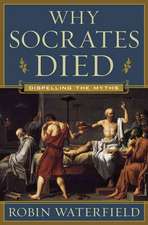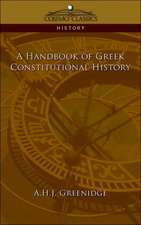Taken at the Flood: Ancient Warfare and Civilization
Autor Robin Waterfielden Limba Engleză Paperback
The 53-year period Polybius had in mind stretched from the start of the Second Punic War in 219 BCE until 167, when Rome overthrew the Macedonian monarchy and divided the country into four independent republics. This was the crucial half-century of Rome's spectacular rise to imperial status, but Roman interest in its eastern neighbors began a little earlier, with the First Illyrian War of 229, and climaxed later with the infamous destruction of Corinth in 146.
Taken at the Flood chronicles this momentous move by Rome into the Greek east. Until now, this period of history has been overshadowed by the threat of Carthage in the west, but events in the east were no less important in themselves, and Robin Waterfield's account reveals the peculiar nature of Rome's eastern policy. For over seventy years, the Romans avoided annexation so that they could commit their military and financial resources to the fight against Carthage and elsewhere. Though ultimately a failure, this policy of indirect rule, punctuated by periodic brutal military interventions and intense diplomacy, worked well for several decades, until the Senate finally settled on more direct forms of control.
Waterfield's fast-paced narrative focuses mainly on military and diplomatic maneuvers, but throughout he interweaves other topics and themes, such as the influence of Greek culture on Rome, the Roman aristocratic ethos, and the clash between the two best fighting machines the ancient world ever produced: the Macedonian phalanx and Roman legion. The result is an absorbing account of a critical chapter in Rome's mastery of the Mediterranean.
| Toate formatele și edițiile | Preț | Express |
|---|---|---|
| Paperback (2) | 71.11 lei 31-38 zile | +29.22 lei 6-12 zile |
| Oxford University Press – | 124.94 lei 3-5 săpt. | +55.73 lei 6-12 zile |
| OUP OXFORD – 9 noi 2016 | 71.11 lei 31-38 zile | +29.22 lei 6-12 zile |
| Hardback (2) | 123.88 lei 10-17 zile | +48.42 lei 6-12 zile |
| OUP OXFORD – 16 apr 2014 | 123.88 lei 10-17 zile | +48.42 lei 6-12 zile |
| Oxford University Press – 10 apr 2014 | 178.35 lei 3-5 săpt. |
Preț: 124.94 lei
Nou
Puncte Express: 187
Preț estimativ în valută:
23.91€ • 25.38$ • 19.92£
23.91€ • 25.38$ • 19.92£
Carte disponibilă
Livrare economică 06-20 decembrie
Livrare express 21-27 noiembrie pentru 65.72 lei
Preluare comenzi: 021 569.72.76
Specificații
ISBN-13: 9780190468880
ISBN-10: 0190468882
Pagini: 320
Dimensiuni: 155 x 234 x 18 mm
Greutate: 0.46 kg
Editura: Oxford University Press
Seria Ancient Warfare and Civilization
ISBN-10: 0190468882
Pagini: 320
Dimensiuni: 155 x 234 x 18 mm
Greutate: 0.46 kg
Editura: Oxford University Press
Seria Ancient Warfare and Civilization
Notă biografică
Robin Waterfield is an independent scholar, living in southern Greece. In addition to more than 25 translations of works of Greek literature, he is the author of numerous books, most recently Dividing the Spoils: The War for Alexander the Great's Empire.
Descriere
Descriere de la o altă ediție sau format:
The Romans first set military foot on Greek soil in 229 BCE; only sixty or so years later it was all over, and shortly thereafter Greece became one of the first provinces of the emerging Roman Empire. It was an incredible journey - a swift, brutal, and determined conquest of the land to whose art, philosophy, and culture the Romans owed so much. Rome found the eastern Mediterranean divided, in an unstable balance of power, between three great kingdoms - the three Hellenistic kingdoms that had survived and flourished after the wars of Alexander the Great's Successors: Macedon, Egypt, and Syria. Internal troubles took Egypt more or less out of the picture, but the other two were reduced by Rome. Having established itself, by its defeat of Carthage, as the sole superpower in the western Mediterranean, Rome then systematically went about doing the same in the east, until the entire Mediterranean was under her control. Apart from the thrilling military action, the story of the Roman conquest of Greece is central to the story of Rome itself and the empire it created. As Robin Waterfield shows, the Romans developed a highly sophisticated method of dominance by remote control over the Greeks of the eastern Mediterranean - the cheap option of using authority and diplomacy to keep order rather than standing armies. And it is a story that raises a number of fascinating questions about Rome, her empire, and her civilization. For instance, to what extent was the Roman conquest a planned and deliberate policy? What was it about Roman culture that gave it such a will for conquest? And what was the effect on Roman intellectual and artistic culture, on their very identity, of their entanglement with an older Greek civilization, which the Romans themselves recognized as supreme?
The Romans first set military foot on Greek soil in 229 BCE; only sixty or so years later it was all over, and shortly thereafter Greece became one of the first provinces of the emerging Roman Empire. It was an incredible journey - a swift, brutal, and determined conquest of the land to whose art, philosophy, and culture the Romans owed so much. Rome found the eastern Mediterranean divided, in an unstable balance of power, between three great kingdoms - the three Hellenistic kingdoms that had survived and flourished after the wars of Alexander the Great's Successors: Macedon, Egypt, and Syria. Internal troubles took Egypt more or less out of the picture, but the other two were reduced by Rome. Having established itself, by its defeat of Carthage, as the sole superpower in the western Mediterranean, Rome then systematically went about doing the same in the east, until the entire Mediterranean was under her control. Apart from the thrilling military action, the story of the Roman conquest of Greece is central to the story of Rome itself and the empire it created. As Robin Waterfield shows, the Romans developed a highly sophisticated method of dominance by remote control over the Greeks of the eastern Mediterranean - the cheap option of using authority and diplomacy to keep order rather than standing armies. And it is a story that raises a number of fascinating questions about Rome, her empire, and her civilization. For instance, to what extent was the Roman conquest a planned and deliberate policy? What was it about Roman culture that gave it such a will for conquest? And what was the effect on Roman intellectual and artistic culture, on their very identity, of their entanglement with an older Greek civilization, which the Romans themselves recognized as supreme?
Recenzii
The story Waterfield tells is complex, but he tells it well.
This sorry story is told with great verve and pace by Waterfield.
This sorry story is told with great verve and pace by Waterfield.
